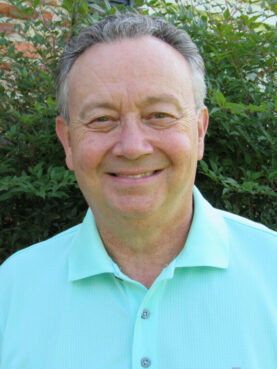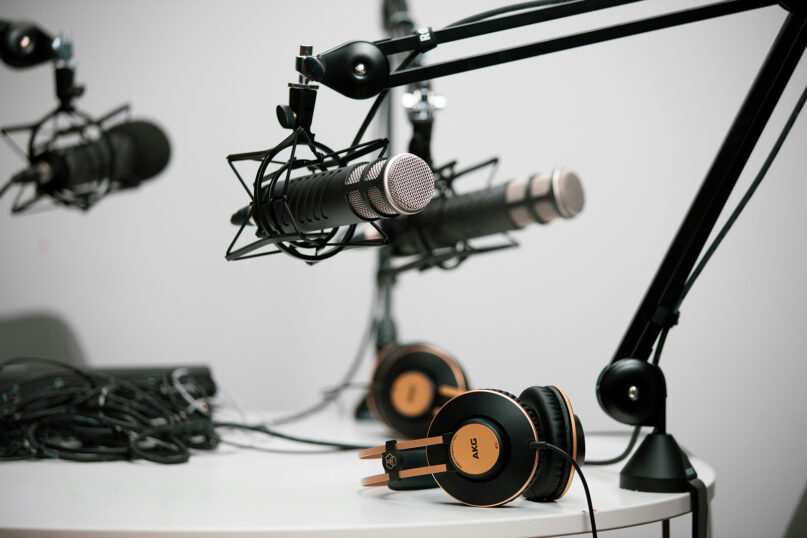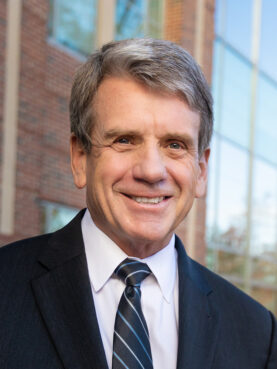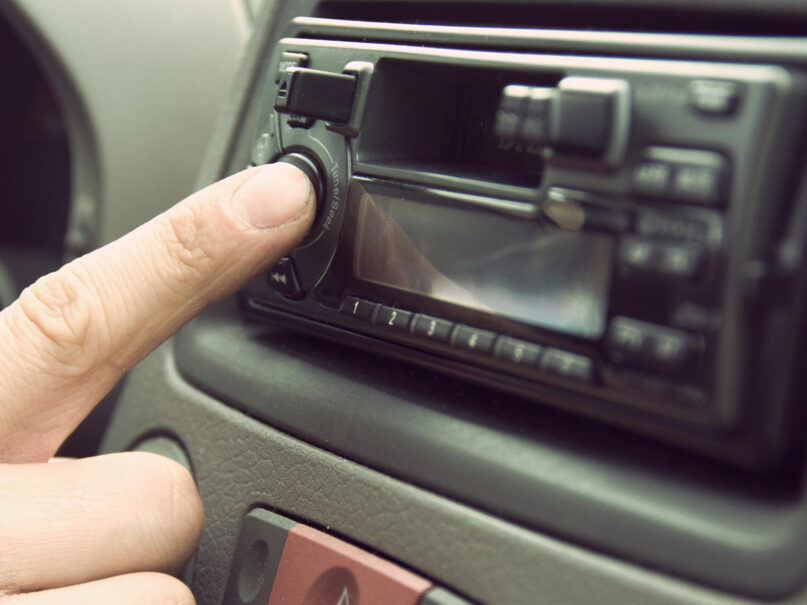(RNS) — Faith Radio president Scott Beigle’s quest for Christian radio started with 1070AM, a former CNN news station in Tallahassee, Florida.
After moving from northern Alabama to the Florida Panhandle with his wife and three kids, Beigle, who is Baptist, noted the lack of Christian radio stations in the area and felt compelled to change that. Months later, on Oct. 6, 1997, that calling became a reality as the Faith Radio Network’s blend of evangelical Christian music and teachings hit the airwaves on 1070AM.
Nearly three decades later, the nonprofit network has grown to include 12 other Christian radio stations. Their flagship station, 1070AM, has been converted to a Spanish-language Christian station to meet the needs of Latino Christians in the region — “there was no one doing that in our area,” Beigle told RNS.
But in recent years, the future of 1070AM has become uncertain, even as Beigle said its message has become more vital.

Scott Beigle. (Photo courtesy of Faith Radio)
“A lot of them, especially now with the immigration and all, they’re scared,” Beigle said of 1070AM’s Spanish-speaking listeners. “And we understand they’re scared to go out — but they’re not scared to listen, to turn that AM radio on to hear their language, and to hear how God can change their life.”
In recent decades, AM radio, known especially for talk radio, has faded in popularity with the arrival of the clearer but more limited reach of FM signals, in addition to streaming and satellite radio. A 2025 survey from Barna Group and the National Religious Broadcasters found listeners access Christian radio from multiple sources, with 68% saying they listen to FM stations, 57% a website or app, 38% satellite radio and 37% AM stations.
While AM stations remain a smaller but consequential part of America’s radio landscape — the National Association of Broadcasters reports 80 million Americans still listen to AM radio each month on over 4,000 AM stations — AM radio now faces an existential threat: removal from cars. Citing dwindling audiences and technological clashes with electric vehicle equipment, automakers such as Ford, Volkswagen, Tesla and BMW have begun phasing out AM radio in some newer vehicles.
A diverse coalition of stakeholders linked with conservative talk shows, foreign language stations and religious broadcasters is teaming up in the halls of Congress, advocating to salvage AM radio’s spot on the nation’s dashboards, at least temporarily.

(Photo by Jonathan Farber/Unsplash/Creative Commons)
For many Christian stations, the legislative effort has spiritual stakes.
“We’re in the hope business — to see their lives changed,” Beigle said.
The AM Radio for Every Vehicle Act is the latest iteration of a bill that would require United States automakers to include AM receivers in new vehicles for the next 10 years. Though the bill has already gained broad bipartisan support — with at least 218 co-sponsors of the House version and 61 of the Senate — the House version is still in committee, while the vote on the Senate version has yet to be scheduled.
“We have more than enough votes to pass it in the House right now, but to make it a priority in a moment where there’s just a whole lot of four- and five-alarm fires you have to put out, it’s hard to do something that’s more of a long-term concern,” said Mike Farris, legal counsel for the National Religious Broadcasters, a multimedia association founded by evangelical Christian broadcasters in the 1940s. The NRB, which has more than 120 AM stations among its members, has been one of several groups advocating for the legislation.

Mike Farris. (Courtesy photo)
Proponents of AM radio say the medium has long been a key source of emergency communication. The Federal Emergency Management Agency’s warning system relies on AM stations for emergency alerts, and local AM stations are known for distributing critical updates in a crisis — particularly in more rural areas, where AM is sometimes the only signal available. Carolyn Cassidy, a regional general manager for Christian media conglomerate Salem Media Group, said her stations give AM listeners in Tampa, Florida, information on how to prepare for, ride out and recover from severe storms during hurricane season.
“It’s a First Amendment issue, it’s a religious issue, but it’s also a public safety issue, because AM radio is the backbone of the Emergency Alert System,” said Nic Anderson, vice president of government affairs for Salem. He said he fears that excluding AM radio from cars is a move toward giving automakers control over what drivers can listen to.
Known for promoting Christian and conservative values, Salem Media Group owns and operates roughly 80 stations, 84% of which fall on AM, Anderson said. The group also has about 3,000 affiliate stations that are owned locally but carry Salem programs — of those, 900 are AM stations.
In addition to advocating on Capitol Hill, Salem has been raising awareness among listeners by distributing prerecorded, pro-AM radio public service announcements from evangelical Christian leaders and influencers such as Focus on the Family President Jim Daly and Turning Point USA founder Charlie Kirk.

(Photo by Breakingpic/Pexels/Creative Commons)
“For generations, AM radio has brought the hope of the gospel, biblical teaching and encouragement right into our homes and cars, especially in times of crisis,” Kirk said in one of the announcements. “But now, some automakers want to eliminate AM radio from new vehicles. Let’s stand together and protect this ministry lifeline.”
Broadcasters say one reason Christian stations are especially available in the AM format is because it’s a more affordable option than FM, making it more accessible to smaller, niche stations of all stripes, including farming and foreign language stations.
“AM allows for certain formats that can’t command the bigger dollars from agencies. They have more of a local appeal,” said Orlando Boyd, general manager of The Gospel Nashville, which offers a mix of music and talk shows that cater to Christian audiences. “It’s really to get that foot in the door … for people trying to break into the radio business.”

Sheila Brown. (Courtesy photo)
Boyd said The Gospel Nashville began as an AM station and later added an FM translator, which “piggybacks” on the AM station to play the same content on an FM frequency. But the AM station is still a key part of the branding and reach. It’s vital, he said, for listeners in remote settings and is often the first choice for those over age 40.
Sheila Brown, who owns two AM radio stations — WUFO (1080AM) in Buffalo, New York, and WIGO (1570 AM) in Atlanta — said listeners on the east side of Buffalo and the south side of Atlanta especially depend on these stations’ unique blend of R&B, gospel and talk shows to reflect their interests and experiences.
“We’re running our own narrative when it comes to our talk shows, our music, our format. No one else in either city has the formats that we have,” Brown said.
Brown started her career in an entry-level position at WUFO in 1986 and worked her way up to become owner and CEO in 2013. She went on to purchase WIGO in 2022. While WUFO in Buffalo has since added a translator to air its content on an FM signal, WIGO in Atlanta is a standalone AM station.
Brown’s stations feature daily gospel music and sermon segments, and on Sundays, they play religious content all day. That’s why for the lifelong member of Pilgrim Missionary Baptist Church in Buffalo, the fight for AM radio is a matter of faith.
“You have so many people that are sick and shut in, who can’t get out to their churches like they used to,” Brown said. “But when they turn to us, they’ll get the same singing, ministry, preaching that they would if they would be at their church.”







